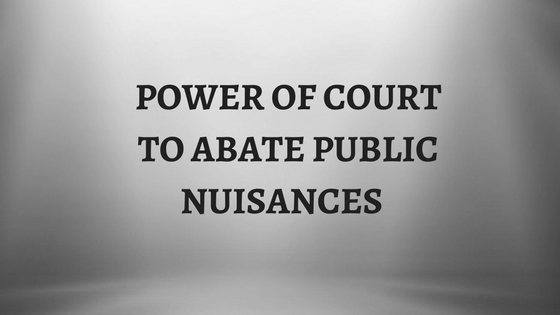Aapka Consultant Judgment Series- In this series, we are providing case analysis of Landmark Judgments of Hon’ble Supreme Court of India.
Municipal Council, Ratlam v. Shri Vardhichand and Ors
AIR 1980 SC 1622, [1980] 4 SCC 162
JUDGES: V.R. Krishna Iyer and O. Chinnappa Reddy
Date of Decision: 29-07-1980
FACTS:-
Facts in brief, the respondents – the local resident of the Ratlam Municipalities moved an application under S.133 of Cr.P.C. against the appellant by stating that the Municipality had failed despite several pleas, to meet its basic obligations, like provision of sanitary facilities on the roads, public conveniences for slum dwellers who were using the road for that purpose, and prevention of the discharge from the nearby Alcohol Plant of maladorous fluids into the public street, and that the Municipality was oblivious to the statutory obligation envisaged in s. 123 M. P. Municipalities Act, 1961. The Magistrate found the facts proved, and ordered the municipality to provide the amenities and to abate the nuisance by constructing drain pipes with flow of water to wash the filth and stop the stench within a proper time limit. The order of the Magistrate was found unjustified by the Sessions Court, but was upheld by the High Court which gave rise to this appeal.
ISSUE:-
Whether the court can compel a statutory body to carry out its duty to the community by constructing sanitation facilities at great cost and on a time-bound basis?
JUDGMENT:-
The Apex Court evaluated the order of both the lower courts and relevant provisions of law with respect to the powers of the Magistrate to take action and duties of the appellant. The provisions set out in S.133 of Cr.P.C. empower the magistrate to take necessary steps to abate public nuisance and has all judicial powers to take necessary action to remove public nuisance and the appellant or other executive authority are bound by the order under S.133 Cr.P.C. Also, S. 123 does not allow extricating the appellants to perform its part of responsibilities.
The submission of appellant counsel for insufficient fund to carry out its duties found no stand in this case. The Criminal Procedure Code operates against statutory bodies and others regardless of the cash in their lockers, even as human rights under Part III of the Constitution have to be respected by the State regardless of budgetary provision. Thus, wherever there is a public nuisance, the presence of S.133 Cr.P.C. must be adopted. The Apex Court interpreted Article 21 which guarantees the fundamental right to life and personal liberty, to include the right to a wholesome environment and held that a litigant may assert his or her right to a healthy environment against the State by a writ petition to the Supreme Court or a High Court.
The Court has also made effort to make the order of magistrate workable by selecting suitable tender and time framed to clean the city which would be watch-dog by the court. Further directions were made enjoining upon the public authority as to stop the effluents from the Alcohol Plant flowing into the street and build and maintain sanitation facilities, instructions to the Malaria Eradication Wing to stop mosquito breeding and other safety measure and finally an action could be taken on non failure to perform its duty. After being urged by the local authority, the Apex Court modified the magisterial orders, allowing more time and less costly options.
Thus, upholding correct the High Court’s view of the law and affirmation of the Magistrate’s order, the apex court disposed of the present appeal with certain directions as to the take affirmative action to provide toilets, drainage facilities, access to fresh water, remove nuisance and basic sanitation facility within a framed time limit and according to certain guidelines by the appellant-municipality and in case of failure to perform its duties, the Sub Divisional Magistrate or court will prosecute against the officers responsible.
HELD:-
Thus, magistrate possesses all judicial powers to compel municipal body to carry out its duty towards the community to provide amenities and abate nuisance and take immediate action to make the remedy effective.
To Get Legal Opinion from Advocates/ Legal Experts, Please click here
To Get Legal Opinion from Retired Hon’ble Judges, Please click here












